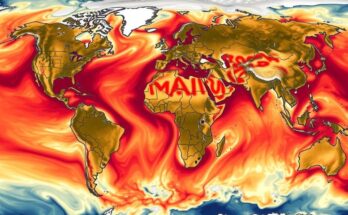The article examines the political turmoil following hurricanes Helene and Milton in the U.S., focusing on the denial of climate change among Republicans and scattered misinformation amidst electoral tensions. In contrast, it highlights India’s effective disaster management and the paradox of government actions contributing to environmental degradation, thereby undermining disaster mitigation efforts.
In the wake of the recent hurricanes Helene and Milton, the United States is embroiled in fierce political strife, with opinions on climate change diverging along party lines. Former President Donald Trump has been vocal in his criticism of the Biden-Harris administration’s management of hurricane response efforts, claiming failures in relief operations. This situation has amplified the spread of various conspiracy theories among Republican Trump supporters, who have accused the administration of orchestrating the weather and blaming these natural disasters on political motives. Misinformation, including AI-generated imagery that exaggerates the effects of the hurricanes, has added to the narrative of government incompetence. The core of this contentious debate lies in the refusal of some conservative factions to accept the scientific consensus regarding climate change’s influence on extreme weather phenomena. Numerous studies indicate that climate change has intensified hurricanes, leading to more severe and wetter storms. Nevertheless, the prominent oil lobby in the United States promotes the belief that these conditions are merely part of a natural cycle, diverting blame from ongoing environmental threats. In contrast, India’s experience with cyclone management stands out. The country has effectively handled disasters such as cyclone Nisarga in 2020, where over 100,000 individuals were evacuated with remarkable efficiency. Additionally, cyclone Fani in 2019 saw the evacuation of a staggering 1.2 million people in less than two days. This success can largely be attributed to comprehensive disaster readiness plans and a national consensus on climate change awareness, thereby mitigating the adverse impacts of such events. Conversely, Indian policymakers continue to endorse initiatives that jeopardize environmental health, including projects that devastate significant ecological areas like the Aravalli Range and various protected regions in the Western Ghats and Himalayas. While India demonstrates proficiency in disaster response, it simultaneously contributes to the emergence of climate-related challenges. This editorial commentary underscores the complexity of addressing climate change impacts and the dichotomy between political narratives in the United States and practical responses in India.
The article discusses the political ramifications following the recent hurricanes in the United States, highlighting the stark contrast between the responses in the U.S. and India to climate-related disasters. It explores the division in American politics over climate change acknowledgment and the subsequent spread of misinformation, particularly among Republican supporters of Donald Trump. Additionally, it emphasizes India’s effective disaster management strategies and the ongoing environmental issues exacerbated by government-sanctioned projects, thereby illustrating the multifaceted nature of climate change discourse.
In conclusion, the article illustrates how hurricanes are impacting political discourse in the U.S., with a significant divide on climate change acknowledgment among its leaders. While India showcases efficient disaster response with a cohesive approach to climate awareness, it simultaneously grapples with environmental degradation produced by state-endorsed projects. This juxtaposition reveals the pressing need for a unified understanding and strategy towards climate change that prioritizes both disaster readiness and environmental integrity.
Original Source: timesofindia.indiatimes.com




